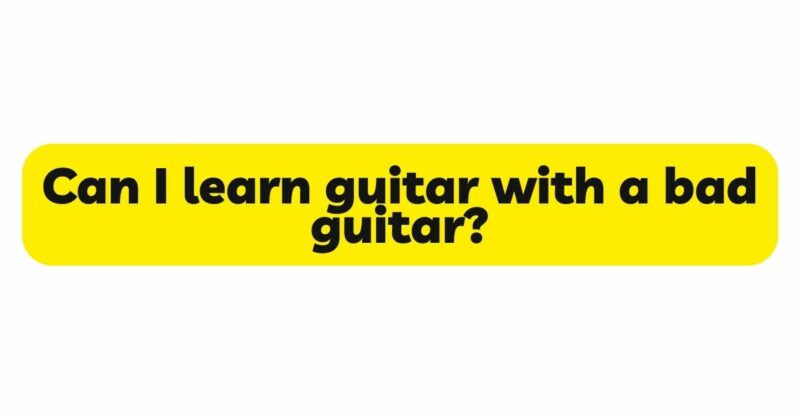When aspiring guitarists set out on their musical journey, they often worry about the quality of their instrument. The question arises: Can I learn guitar with a bad guitar? In this article, we will explore the possibilities and advantages of learning to play guitar despite having a less-than-ideal instrument. From determination and resourcefulness to the importance of technique and passion, we will debunk the notion that a “bad” guitar hinders one’s ability to learn and excel in the art of playing the guitar.
- The Instrument Does Not Define the Musician:
It is essential to recognize that the instrument does not define the musician. While a good guitar can enhance the playing experience, a so-called “bad” guitar does not automatically limit one’s ability to learn and progress. The key factors in guitar learning lie within the musician’s determination, dedication, and passion.
- Focus on Technique and Fundamentals:
Learning guitar with a “bad” instrument can actually provide an opportunity to focus on technique and fundamental skills. By developing proper finger placement, chord shapes, and strumming techniques, beginners can build a strong foundation regardless of the instrument’s quality. In fact, the limitations of a “bad” guitar can encourage creativity and resourcefulness in finding alternative ways to produce desired sounds and achieve desired effects.
- Building Resilience and Adaptability:
Learning to play guitar on a less-than-ideal instrument builds resilience and adaptability. Aspiring guitarists who start with a “bad” guitar learn to adapt to its unique characteristics and overcome limitations. This adaptability can later translate into being able to play and adapt to various instruments and setups, making musicians more versatile and adaptable in their playing.
- Developing a Keen Ear:
Playing a “bad” guitar can develop a musician’s ear for intonation and sound quality. With an instrument that may not produce optimal tones or sustain, musicians are forced to listen more carefully and make adjustments accordingly. This heightened awareness of sound quality and intonation can be an asset in the long run, as it fosters a better ear for music and the ability to produce desired sounds on any instrument.
- Utilizing Online Resources and Supportive Communities:
In today’s digital era, aspiring guitarists have access to a vast array of online resources and supportive communities. Online tutorials, lessons, forums, and social media groups provide a wealth of knowledge and guidance. By leveraging these resources, beginners can overcome any limitations associated with a “bad” guitar and tap into the collective wisdom of experienced musicians.
- Seek Opportunities for Improvement:
While a “bad” guitar may present challenges, it is important to seek opportunities for improvement. Making adjustments and modifications to the instrument can enhance its playability and sound quality. Simple changes such as adjusting the action, replacing worn-out strings, or upgrading certain components can make a noticeable difference. Seeking guidance from guitar technicians or experienced players can provide insights on how to optimize a “bad” guitar’s performance.
- The Power of Passion and Dedication:
Passion and dedication are the driving forces behind musical progress, irrespective of the quality of the instrument. A genuine love for music and the desire to improve can overcome any limitations imposed by a “bad” guitar. With dedication and consistent practice, aspiring guitarists can achieve remarkable results, even with an instrument that may not be considered ideal.
- Transitioning to a Better Instrument:
As beginners progress and improve their skills, they may eventually desire a higher-quality instrument that aligns with their evolving musical aspirations. Transitioning to a better guitar is a natural part of a musician’s journey. The experience gained from learning on a “bad” guitar can help beginners appreciate the nuances and improvements offered by a higher-quality instrument when the time comes to make the transition.
Conclusion:
Learning guitar with a “bad” instrument is not a hindrance but an opportunity for growth and musical development. While a good guitar can enhance the playing experience, it is not a prerequisite for learning and excelling in the art of guitar playing. Determination, passion, and resourcefulness are far more crucial factors in the learning process. By embracing the instrument at hand and focusing on technique, fundamentals, and personal growth, aspiring guitarists can embark on a fulfilling musical journey. Remember, it is not the guitar that defines the musician, but the musician who brings life and creativity to the instrument. With dedication, passion, and the desire to improve, any guitar, regardless of its perceived quality, can become a tool for self-expression and musical exploration.


